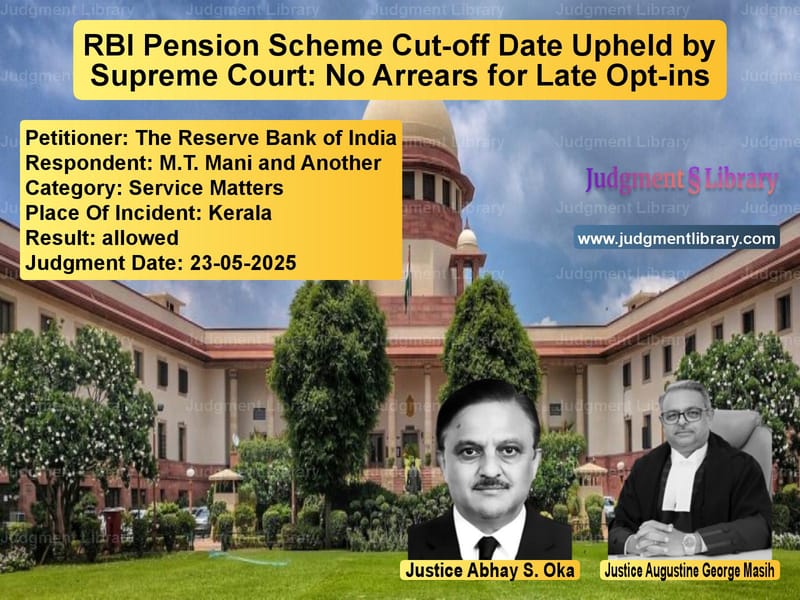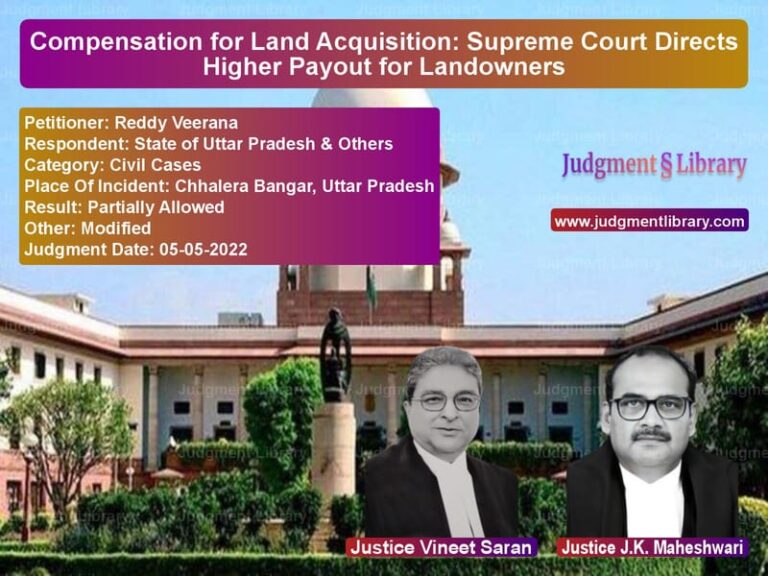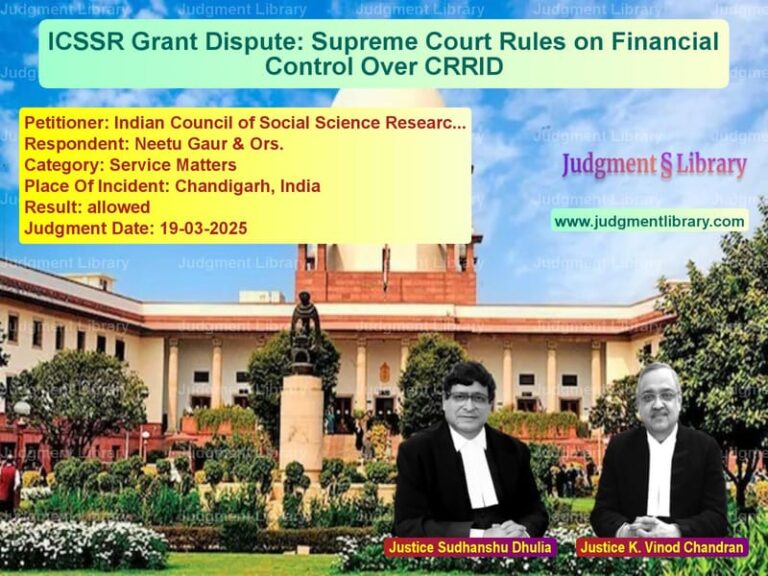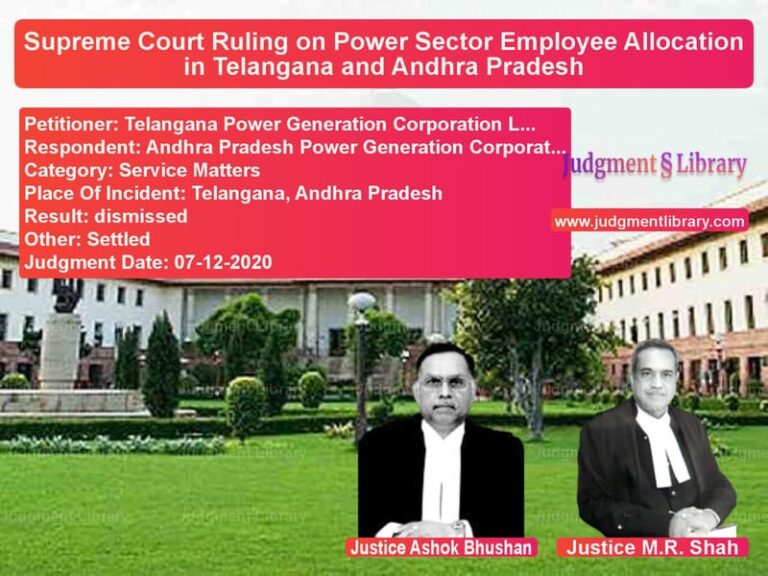RBI Pension Scheme Cut-off Date Upheld by Supreme Court: No Arrears for Late Opt-ins
In a landmark judgment that balances employee pension rights with institutional financial constraints, the Supreme Court of India has delivered a crucial verdict upholding the Reserve Bank of India’s decision to grant pension benefits only prospectively from July 1, 2020, to employees who opted for the pension scheme under a one-time window after multiple earlier refusals. The case, which pitted a retired RBI manager against the central banking institution, revolved around whether the RBI could deny pension arrears from the actual date of retirement to employees who belatedly switched from the Contributory Provident Fund scheme to the pension scheme.
The dispute originated from M.T. Mani, who joined RBI service on September 14, 1981, and consistently chose to remain under the CPF scheme despite four opportunities to switch to the pension scheme in 1990, 1992, 1995, and 2000. After retiring on November 30, 2014, and receiving all CPF benefits, Mani sought to join the pension scheme when RBI opened a final one-time window in 2020. However, the 2020 scheme explicitly stated that pension would be payable only from July 1, 2020, with no arrears for the period prior to this date. This limitation became the central point of legal contention.
The Historical Context of RBI Pension Schemes
The RBI first introduced its Pension Regulations in 1990, effective from November 1, 1990, giving existing employees an option to join the new pension scheme or continue with the CPF. The regulations clearly stated that employees retiring between January 1, 1986, and October 31, 1990, although eligible to join the Pension Scheme, would receive pension only from November 1, 1990, onwards, with no arrears for the period before this date. This established a precedent that when switching schemes, benefits would not be retrospective.
Read also: https://judgmentlibrary.com/supreme-court-upholds-teachers-appointment-in-caste-category-dispute/
Subsequent opportunities in 1992 and 1995 followed similar patterns, with each scheme having its own specific terms and conditions. Notably, the government of India had rejected RBI’s proposals for additional option windows in 2002, 2018, and 2019 before finally approving the 2020 scheme. This approval came with the clear understanding that the financial liability would be limited by making pension payments prospective from July 1, 2020.
The 2020 Scheme and the Legal Challenge
On September 14, 2020, RBI issued Administration Circular No. 1, offering a final opportunity for existing CPF optees and former employees who were in service on or after November 1, 1997, and retired with CPF to opt for the Pension Regulations. The circular explicitly stated that “eligible employees and the family members would be entitled to draw monthly pension/family pension with effect from 01.07.2020 and no arrears of pension will be paid for the period prior thereto.”
Detailed implementation instructions followed on September 18, 2020, reinforcing that “after completion of all formalities, eligible retired employees will start drawing pension with effect from July 1, 2020. No arrears of pension will be paid for the period prior to July 1, 2020.” The scheme required employees to refund the bank’s CPF contribution with accrued interest along with simple interest at 3% per annum from the date of receipt until refund.
M.T. Mani exercised this option and began receiving pension from July 2020 but simultaneously challenged the denial of arrears from his retirement date in November 2014. The Kerala High Court’s Division Bench ruled in his favor, directing RBI to pay pension benefits from his actual retirement date. This decision prompted RBI to approach the Supreme Court.
Arguments Before the Supreme Court
The RBI’s counsel presented detailed arguments emphasizing that the 2020 scheme was a complete package with clearly stated terms. They argued that “the Respondent, having unconditionally accepted all terms of these circulars and filled in the requisite forms etc. and fulfilled the conditions as laid down therein, cannot now be permitted to challenge unfavourable conditions. The Scheme as a whole had to be given effect to as a package deal.”
The financial implications were significant. RBI contended that “an employer is entitled to consider several aspects while fixing a particular date for implementation of a scheme such as financial constraints, administrative exigencies, economic conditions, and other relevant circumstances.” They highlighted that “the retrospective financial burden would have resulted in an unjustified liability of over 900 crores for the RBI, which would have led to a financially unsustainable scenario.”
RBI also emphasized the principle of approbation and reprobation, arguing that “the Respondent cannot be permitted to approbate and reprobate at the same time, i.e., accept the Pension Scheme as it is and then demand retrospective benefit of arrears of pension contrary to the agreed terms.”
M.T. Mani’s counsel countered these arguments, supporting the High Court’s judgment. They submitted that “all through, whenever the Circulars have been issued, the employees have been granted the benefit of arrears of pension from the date of their retirement.” They argued that “depriving the Respondent of the benefit of the arrears, when the CPF contribution along with the interest, as required stands deposited, would amount to denying the Respondent the benefit of 67 months of pension, which would not be justified and would be discriminatory and arbitrary.”
They further contended that “under the 1990 Pension Regulations, there is nothing mentioned with regard to non-grant of arrears” and that “the RBI itself had been pushing for giving another option to the employees for switching over to the Pension Scheme. Therefore, it cannot now assert that they would not grant the benefit which was earlier granted under the prior Administrative Circulars.”
The Supreme Court’s Legal Analysis
The Supreme Court, in its detailed analysis, focused on whether fixing the cut-off date of July 1, 2020, for granting pensionary benefits prospectively was arbitrary and discriminatory. The Court extensively referenced its earlier jurisprudence on the matter.
The Court quoted from Mohammad Ali Imam and Others Vs. State of Bihar and Others: “11. Apart from this, there may be other considerations in the mind of the executive authority while fixing a particular date i.e. economic conditions, financial constraints, administrative and other circumstances, and if no reason is forthcoming from the executive for fixation of a particular date, it should not be interfered with by the Court unless the cut-off date leads to some blatantly capricious or outrageous result. In such cases, it has been opined that there must be exercise of judicial restraint and such matters ought to be left to the executive authorities, to fix the cut-off date, and the Government thus, must be left with some leeway and free play at the joints in this connection. Even if no particular reasons are given for the cut-off date by the Government, the choice of cut-off date cannot be held to be arbitrary (unless it is shown to be totally capricious or whimsical).”
The judgment also referenced State of Punjab and Others v. Amar Nath Goyal and Others, where the Court held: “32. The importance of considering financial implications, while providing benefits for employees, has been noted by this Court in numerous judgments… Financial impact of making the Regulations retrospective can be the sole consideration while fixing a cut-off date.” and “37. In the instant case before us, the cut-off date has been fixed as 1-4-1995 on a very valid ground, namely, that of financial constraints. Consequently, we reject the contention that fixing of the cut-off date was arbitrary, irrational or had no rational basis or that it offends Article 14.”
The Court emphasized that “each administrative circular was independent in itself where the competent authority had taken a well-informed, considered, and gauged decision with regard to the applicability, liability and financial implications, apart from the other aspects.” Each scheme had different terms, interest rates, and eligibility criteria tailored to specific financial considerations.
Key Judicial Principles Established
The Supreme Court established several important principles in its judgment. Firstly, it reinforced that “financial constraints can constitute a valid and non-arbitrary basis for fixing a cut-off date for extending pensionary benefits or pay revisions.” Economic considerations are germane to governmental policy decisions, and distinguishing between retirees based on such a date does not violate constitutional equality principles.
Secondly, the Court emphasized the doctrine of approbation and reprobation, stating that “the Respondent cannot be permitted to blow hot and cold in the same breath.” Having voluntarily accepted the terms of the 2020 scheme, M.T. Mani could not selectively accept beneficial terms while rejecting unfavorable ones.
Thirdly, the Court clarified that “individual hardships cannot justify altering a rule of general application” and that “the determination of cut-off dates is a matter of policy-making.” This function lies within the domain of the rule-making authority, not the judiciary, as courts cannot assume the role of framing or modifying policy decisions under the guise of judicial review.
The Court noted that “the present Scheme of the year 2020, was a conglomerate of various factors, with each factor working in tandem with the others making it an effective and workable Scheme” that had been thoroughly evaluated for financial viability.
The Final Ruling and Its Implications
In its concluding observations, the Supreme Court stated: “There being no violation of the Constitutional, Statutory or Common Law principles, interference by the Division Bench vide the impugned judgment while setting aside the judgement of the Single Judge cannot sustain.”
The Court allowed RBI’s appeal, set aside the High Court’s Division Bench judgment, and restored the Single Judge’s decision dismissing M.T. Mani’s writ petition. The ruling establishes that when a pension scheme is offered as a complete package with specific financial terms, including prospective application, employees who voluntarily opt into the scheme cannot subsequently demand retrospective benefits that would alter the fundamental financial calculations underlying the scheme.
This judgment has significant implications for public sector employees and institutions managing pension schemes. It reaffirms the authority of employers to design pension schemes with specific cut-off dates based on financial considerations and protects institutions from unforeseen liabilities that could arise from retrospective application of benefits. The decision also serves as a reminder to employees that when presented with multiple opportunities to opt for beneficial schemes, their choices have consequences, and they cannot expect to receive the same terms when opting in much later than originally offered.
The Supreme Court’s ruling strikes a careful balance between protecting employee pension rights and recognizing the legitimate financial constraints of public institutions, ensuring that pension schemes remain financially sustainable while providing security to retired employees.
Petitioner Name: The Reserve Bank of India.Respondent Name: M.T. Mani and Another.Judgment By: Justice Abhay S. Oka, Justice Augustine George Masih.Place Of Incident: Kerala.Judgment Date: 23-05-2025.Result: allowed.
Don’t miss out on the full details! Download the complete judgment in PDF format below and gain valuable insights instantly!
Download Judgment: the-reserve-bank-of-vs-m.t.-mani-and-anothe-supreme-court-of-india-judgment-dated-23-05-2025.pdf
Directly Download Judgment: Directly download this Judgment
See all petitions in Pension and Gratuity
See all petitions in Employment Disputes
See all petitions in Public Sector Employees
See all petitions in Contractual Employment
See all petitions in Termination Cases
See all petitions in Judgment by Abhay S. Oka
See all petitions in Judgment by Augustine George Masih
See all petitions in allowed
See all petitions in supreme court of India judgments May 2025
See all petitions in 2025 judgments
See all posts in Service Matters Category
See all allowed petitions in Service Matters Category
See all Dismissed petitions in Service Matters Category
See all partially allowed petitions in Service Matters Category







